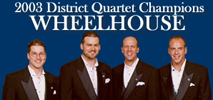
Questions? Ask MAD!




District Media InfoBackgroundFor decades, the District has struggled to provide quality video recordings both for the performers/contestants and for the historical records (archives). We first started off video recording with consumer grade cameras. Quality provided by these cameras was standard definition (SD) format, and while quartets may have found them adequate for review purposes, choruses were left with little more than a memento of the event. Copies of the recordings (in recent history) were first distributed on VHS tape, which of course degrade over time.With the advent of the 'Events Team' came the addition of professional contractors for Video, Audio & Lighting (not necessarily in that order). And while the video contractors used pro-sumer grade equipment or better, the distributed media was still SD on VHS. As brighter stage lighting was introduced, capturing a hi-fidelity image became even more difficult to capture; faces and bright-colored clothing were difficult to record and often appeared 'washed-out' on the final recording. Integrating the audio feed from the sound board to the video capturing device sometimes proved difficult, and was often over-looked until post-production. In those cases, if the audio was married to the video, it was usually out of sync. Recently, we had asked for the performances to be distributed via DVD. Problems with this involved either: burning the DVD in real time, requiring several burners and creating delays in the contest schedule; or burning them after the contest and sending them via mail approximately two weeks later. Both solutions were unacceptable. Regardless of the problems introduced by the DVD processing procedures, the quality afforded by the DVD resolution (while still better than SD quality) was insufficient to clearly observe faces of the members of a chorus. Financially, providing video recordings for the contestant was a money-loser for the District. Over the course of a typical contest year, we would spend several thousands of dollars for videographers. In return, the District got back only about half of that by charging the competitors outrageous rates for their recordings. Unfortunately, more and more competitors refused to purchase the material because of the low quality or the high price or both, which compounded the problem. PurposeThen we asked ourselves, "What do we really need from a video recording of a contestant performance?", we find the answer very simply; Contestants want a recording that they can see and hear themselves with some high degree of quality.This means:
Bottom LineFrom now on, we will record each contestant, with a High Definition video camera, save that recording to computer, and (after some processing) electronically distribute the content to the contestant via Internet. We can capture the Audio directly from the sound board into the camera.Director Camera footage will be collected & distributed the same way. Only the Director him/herself will have access to their own DirectorCam footage. User agreement The Media contained on this website is copyright protected by the Mid-Atlantic District. YOU MAY NOT DISTRIBUTE OR REBROADCAST THESE RECORDINGS. The District owns the copyrights to all performances from our conventions. This material is protected by copyright and other applicable laws in the United States and other nations and may not be duplicated, distributed, re-broadcast, or used in any other manner without the expressed written consent of the District. It is intended for your personal use and educational purposes only. Any public exhibition or broadcast of this material is strictly prohibited by law. This includes sites such as YouTube, MySpace and Facebook. |